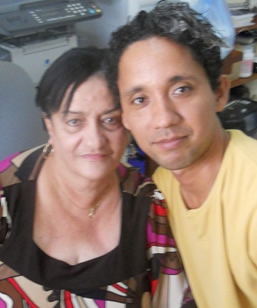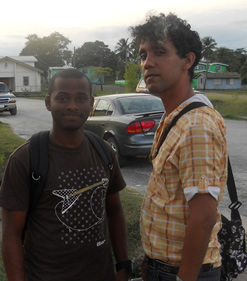Posted by Kent Klindera, October 19, 2010

Nurse Bradley and Caleb Orozco at the HIV counseling and testing center in Belize City.
I’m in Belize visiting with the United Belize Advocacy Movement (UNIBAM), which amfAR’s MSM Initiative has been supporting for the past two years. UNIBAM’s leader, Caleb Orozco, has brought me to San Ignacio—a town near the Guatemalan border—to meet with a group of “his people.” It’s Friday, and, just as it is for most young gay men in the world, Friday night is party night. We met up with about 10 guys who gather every week at a friend’s house for some good food, music, and dancing. It was an evening of 20-somethings (and some older teens) being themselves—some single/some couples, but all able to let their hair down. Belize, like most of the world, is a very homophobic place, and letting down your hair can only really happen behind closed doors. What a wonderful scene the party was!
I had spent the prior two days meeting with healthcare workers and health officials, and I was having mixed feelings—at times hopeful and at times depressed. I met an amazing woman named Nurse Bradley, who has become an authority on MSM health. Initially she was not receptive to working with gay men, but Caleb was persistent. Now, guys come for miles to see her for HIV testing; for antiretroviral therapy; for the management of STIs; and, most importantly, for someone to talk to.
I also met an amazing 20-year-old UNIBAM volunteer named Michael, who told me that a year ago he used to make Caleb walk 10 feet in front him so that no one would suspect they were friends. Today, Michael has come out himself and is organizing others in Belmopan (the political capital of Belize). And he has taken in five or six young guys who have been kicked out of their homes by their parents for being gay or transgender.

Michael, a volunteer with UNIBAM, and the group’s leader, Caleb Orozco, in front of a school where a young student was expelled for cross-dressing.
The meetings I had with authorities were distressing, however. The tag line for Belize’s Ministry of Health is “Equal Health for All,” but the government has no official statistics on how many MSM there are in Belize, and so far there has been no direct investment in HIV programming for MSM. Belize is next door to Mexico, whose authorities have clearly documented that MSM are in need of specific investment to reduce the spread of HIV. In our meetings, officials mentioned that an MSM sero-prevalence study is just getting started (with funding from the U.S. Centers for Disease Control and Prevention) but results will not be available until late 2012 at best. Caleb and I asked how many more men will die between now and late 2012, when results will almost certainly show that MSM are at higher risk. Although well-meaning, the ministry representative was not showing the kind of leadership needed.
On a positive note, UNIBAM recently started documenting hate crimes to help make a case to authorities about the dangers MSM face, and it also defended a male student who was expelled from a state-run school for wearing a girl’s uniform (he was re-instated). Most importantly, UNIBAM has filed a case (with support from amfAR) to decriminalize same-sex behavior, a move that LGBT rights groups throughout the Caribbean are watching. Success in Belize could produce a domino effect throughout the region.
Caleb is amazing. He’s been an activist for more than 10 years and he’s a little tired, but he does an incredible job of cultivating the spirit of activism, especially among the younger LGBT community in Belize. Personally, I put my faith in the 20-somethings at the party in San Ignacio….and their social support, which will allow them to come out, be proud, and protect themselves. Maybe the political leaders will someday follow?